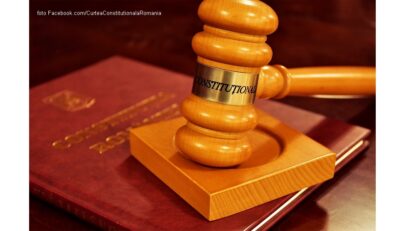New members of the Constitutional Court
The Constitutional Court of Romania has new members for the next 3 years.

Corina Cristea, 14.07.2025, 14:00
The Constitutional Court of Romania has new members and a woman as its president for the first time ever. Simina Tănăsescu was appointed as a member of the court by the country’s former president, Klaus Iohannis, in 2019.
According to the Romanian Constitution, the Constitutional Court is composed of 9 judges, appointed for a 9-year term in office, which cannot be extended or renewed. Of these, 3 judges are appointed by the Chamber of Deputies, 3 by the Senate and 3 by the president of Romania. Every 3 years, the Constitutional Court sees one-third of its members replaced. Judges must have higher education in the judicial field, outstanding professional competence and at least 18 years of experience in the judiciary or law school.
Now it was time for such a replacement. The new members of the Constitutional Court starting their 9-year terms in office are Dacian Cosmin Dragoş, nominated by president Nicuşor Dan, a professor and Ph.D. supervisor at the Law School affiliated to the Babeş-Bolyai University in Cluj-Napoca, and the judges nominated by the 2 chambers of Parliament: Mihai Busuioc, who led the Court of Accounts for the last 8 years, and Csaba Asztalos, who previously chaired the National Council for Combating Discrimination.
On Sunday, after the 3 new constitutional judges were sworn in, in the presence of the president and the PM, Simina Tănăsescu was elected by a majority of votes to lead the Constitutional Court for the next 3 years.
The Constitutional Court is the only authority on constitutional matters in Romania, operating independently of any other public authority and safeguarding the supremacy of the Constitution. It checks that new legislation is in line with the Constitution, resolves legal conflicts between public authorities and protects the fundamental rights of citizens under the law.
Its many powers also include ruling on the constitutionality of treaties or other international agreements, and ruling on unconstitutionality claims regarding laws and government orders raised in courts or arbitration bodies, as well as directly by the Ombudsman. The Court also monitors compliance with the presidential election procedure and validates the results of the vote, gives an opinion in the event of an impeachment procedure, monitors compliance with referendum procedures and validates their results.
The Constitutional Court also plays a key role in parliamentary elections, protecting democracy and the rule of law. It verifies the constitutionality of election laws and other legislation relevant to elections, and settles any challenges regarding the lawfulness of each election. (AMP)






























